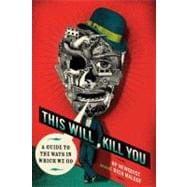
What is included with this book?
HP NEWQUIST is the author of more than a dozen books, including The Great Brain Book (a National Science Teachers' award winner), the Yahoo! Guide to the Internet (a Book of the Month Selection), and Here There Be Monsters. He is also the creator of the Celebrity Death Trio™, a popular blog that chronicles the passing of fabled icons--who always manage to die in threes.
RICH MALOOF is an editor and award-winning writer specializing in health, technology, and music with a dozen published titles to his credit. He is a front-page contributor to MSN.com, and has also written for CNN, Yahoo!, MSNBC, Women's Health, For Dummies, and Sterling Publications, among others.
“Irreverent yet informative…Makes a perfect preventive guide, breezy summer read, or ideal gift for your cousin, the hypochondriac.” –Men’s Fitness
"There’s nothing like a beach read that graphically details exactly how a shark will chew you up. This book...not only explores the myriad ways in which we kick the bucket (pray you never get a Guinea worm infection), it dares to look at death in a lighthearted way. Sure, being burned at the stake is no fun, but reading about it is a hoot." --Boston Herald
"From syphilis to snakes, from alligators to anthrax, THIS WILL KILL YOU is a light-hearted look at the myriad ways we humans can depart this earth. It is an iconoclastic and informative romp through our last moments that will leave readers both informed and amused. I enjoyed it immensely." --Michael Collins, M.D., author of HOT LIGHTS, COLD STEEL and BLUE COLLAR, BLUE SCRUBS
The New copy of this book will include any supplemental materials advertised. Please check the title of the book to determine if it should include any access cards, study guides, lab manuals, CDs, etc.
The Used, Rental and eBook copies of this book are not guaranteed to include any supplemental materials. Typically, only the book itself is included. This is true even if the title states it includes any access cards, study guides, lab manuals, CDs, etc.